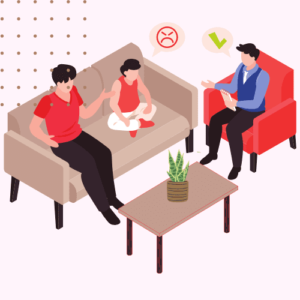
Relationship Anxiety Test
Answer these simple questions to understand more about your Relationship Anxiety. We share instant results and keep your information confidential.

What is Relationship Anxiety Test?
A Relationship Anxiety Test is a psychological assessment tool designed to measure and evaluate an individual’s level of anxiety or distress within their romantic relationships. It typically consists of a series of questions or scenarios that assess various aspects of relationship-related anxiety, such as fear of abandonment, jealousy, trust issues, and communication difficulties. The results of the test can help individuals and therapists gain insights into the specific sources of anxiety in their relationships, enabling them to address and manage these concerns more effectively. These tests can be valuable for couples seeking to improve their relationship dynamics and for individuals working on personal growth and emotional well-being.
Who can benefit from this Relationship Anxiety Test?
The Relationship Anxiety Test can benefit individuals who are experiencing doubts, fears, or insecurities in their romantic relationships. This includes anyone who may be unsure about their partner’s commitment, constantly worries about the future of the relationship, or feels overwhelmed by jealousy or possessiveness. It can also be useful for those who struggle with trust issues or have a history of unhealthy relationships. Taking the test can help individuals gain insight into their emotional responses and behaviors within their relationships, leading to better self-awareness and the potential for personal growth and improved relationship dynamics. It’s a valuable tool for anyone seeking to enhance the quality and stability of their romantic connections.


Relationship Anxiety Test Accuracy
The accuracy of a relationship anxiety test can vary depending on several factors. The reliability and validity of the test itself, as well as the honesty and self-awareness of the person taking it, play crucial roles. A well-designed and scientifically validated test can provide reasonably accurate insights into an individual’s level of relationship anxiety, but it may not be foolproof. People’s feelings and behaviors can change over time, and a single test may not capture the full complexity of their emotions. Therefore, while relationship anxiety tests can be a useful tool for self-reflection, they should be interpreted with caution and in conjunction with professional advice for a more accurate assessment.
Types of Assessment to Measure Relationship Anxiety Test
Interviews:
Clinical interviews conducted by trained professionals can delve deeper into an individual’s relationship anxiety. These interviews can be structured or semi-structured and allow for a more in-depth exploration of thoughts, feelings, and behaviors related to relationships.
Observational Methods:
Observing couples in therapy or natural settings can provide insights into relationship anxiety. This method is often used in conjunction with other assessment techniques.
Physiological Measures:
Some researchers use physiological measures such as heart rate, skin conductance, and cortisol levels to assess physiological reactions to relationship-related stressors.
Implicit Measures:
Implicit association tests (IATs) can assess automatic associations or biases related to relationship anxiety. These tests are designed to uncover subconscious thoughts and feelings.
Behavioral Assessments:
Behavioral assessments involve observing and recording specific behaviors associated with relationship anxiety, such as avoidance, reassurance-seeking, or jealous behaviors.
Narrative Assessments:
Individuals may be asked to write narratives or stories about their relationship experiences. Analyzing these narratives can provide insights into their relationship anxiety.
Handling Relationship Anxiety
Handling relationship anxiety can be challenging, but with some strategies and techniques, you can work to reduce and manage your anxiety in the context of your relationships. Here are some steps to help you cope with relationship anxiety:
- Acknowledge Your Feelings: Recognize that it’s okay to feel sad, anxious, or depressed when facing relationship problems. Accepting your emotions is the first step toward addressing them.
- Communicate Openly: Effective communication is key in any relationship. Talk to your partner about how you’re feeling, what’s bothering you, and what you both can do to improve the relationship. Be honest and open but also respectful and non-blaming in your communication.
- Seek Professional Help: Consider therapy or counseling. A licensed therapist can help you explore and address the underlying issues contributing to your depression. Couples therapy can also be beneficial in resolving relationship conflicts.
- Set Boundaries: Establish healthy boundaries in your relationship. Boundaries define what is acceptable and what isn’t in terms of behavior and interactions. Clearly communicate your boundaries to your partner, and respect theirs as well.
- Self-Care: Prioritize self-care to manage your depression. This includes getting enough sleep, eating well, exercising regularly, and engaging in activities that bring you joy and relaxation. Self-care can help boost your mood and resilience.
- Support Network: Lean on friends and family for emotional support. Talking to trusted individuals about your feelings can provide you with a different perspective and emotional support.
- Mindfulness and Meditation: Practices like mindfulness and meditation can help you manage depressive symptoms by promoting self-awareness and reducing stress. They can also improve your emotional regulation.
- Challenge Negative Thoughts: Depression often comes with negative thought patterns. Learn to identify and challenge these negative thoughts. Cognitive-behavioral therapy (CBT) techniques can be particularly helpful in this regard.
- Self-Compassion: Be kind to yourself during this difficult time. Avoid self-blame and self-criticism. Understand that it’s okay to struggle and seek help when needed.
- Consider Medication: In some cases, medication prescribed by a mental health professional may be necessary to manage severe depression. Consult with a psychiatrist to discuss your options.
Remember that seeking help and support is a sign of strength, not weakness. If you find that your relationship is contributing significantly to your depression and isn’t improving despite your efforts, it may be necessary to consider whether the relationship is healthy and sustainable for your long-term well-being. Ultimately, taking care of your mental health should be a top priority in any situation.